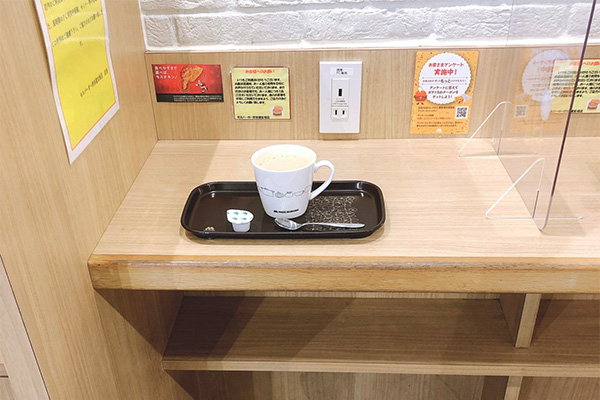“I don’t have a spare battery, but I’ll have to charge it when I go to the cafe later.”
When going out, there are many people who bring a charger that plugs into an outlet instead of an auxiliary battery. When I go out reporting and my laptop or cell phone battery is running low, I first go to a cafe.
These days, it seems like the number of places blocking the use of electrical outlets in our country is gradually increasing, but in Japan’s case, things are a little more strict. Because of this, there is a story that people end up in big trouble if they carelessly recharge their batteries at a cafe while traveling. In fact, there have been cases where people have been punished for charging with a charger plugged into an outlet, so the general consensus is that you need to be careful. Today, I will tell you about Japan’s ‘charging culture’, which is a little different from Korea’s.
‘Do not use outlet’ sticker sold by Rakuten in Japan. Rakuten.
View original icon
Electricity is also wealth… It can even be considered ‘theft’ at school or work.
In Japan, you should not charge your cell phone or laptop just because you find an empty outlet in a cafe or family restaurant. You may be stopped by a store clerk. In fact, questions and posts about this are constantly posted on Japanese portal sites such as Yahoo Japan.
First of all, in places where charging is prohibited, electricity is also treated as property under the law. Article 235 of the Japanese Criminal Code stipulates that ‘any person who steals another person’s property shall be punished by imprisonment for up to 10 years or by a fine of up to 500,000 yen for theft.’ And Article 245 of the Criminal Code clearly states, ‘In this regard, electricity is also considered property.’ For this reason, there is ample room for theft to be committed if electricity at a business is used without permission. In fact, in 2007, two middle school students who were charging their cell phones using an outlet at a convenience store in Osaka were investigated for theft. At the time, unlike today, it was rare for customers to use store outlets, but it is said that using even a small amount of electricity was considered theft and attracted social attention.
Some even say that charging a smartphone at school or work could be considered theft. In particular, many companies have strict rules. This is an inquiry posted on a community of people working in human resources management in Japan. The questioner said, “The company did not issue a separate notice, but recently, it has been noticeable that an employee’s personal smartphone is being charged by plugging it into a work PC. In addition to the unauthorized theft of electricity, which is the company’s property, there is a risk of leakage of company information. “Isn’t this a big problem from your point of view?” and asked, “Please let me know how other companies are responding.” He added, “For your information, I always carry a spare battery with me to work.”
There were many opinions that the answer could also be problematic. Hattori, CEO of the Wage and Labor Support Office, gave a strong response, saying, “The act itself does not seem to be categorized as public or private,” and “It is also related to the regulation prohibiting the removal of goods from the company, so the regulation must be revised as soon as possible.” He also responded strongly, saying, “Even if it is prohibited in private settings, it is only for private use.” There is also an answer that says, “We need flexibility, such as providing a charging corner.”

A branch of Mos Burger in Japan that has a charging station. Basis Tokyo.
View original icon
Investigation into suspicion of theft after middle school student charged at convenience store outlet… Must check if it can be charged
Japan’s Atom Law Office also said in its newsletter, “It doesn’t matter if there is a poster saying that it is okay to charge your smartphone, but if you charge it at will in a place where there is no sign, there is a possibility that it can be a crime of theft.” If you want to charge, check with the person in charge first. He also advised, “Do it first.”
In Korea, charging is possible as long as there is an outlet in a company, cafe, or other place, and there is a sentiment that places that block charging are rather rude. In Japan, this kind of unauthorized use of electricity is also called ‘electricity theft’. There is also an interpretation that it is because electricity bills are so expensive.
However, this does not mean that charging is not possible at all public facilities, and the outlets on high-speed rail and Shinkansen seats can be freely used in the seats. In cafes and family restaurants where charging is available, there are many cases where there is a notice saying ‘Charging OK’. In particular, in cafes, if you look for a place that says ‘Power available (電源あり)’, you can charge your smartphone or even use your laptop with the charger plugged in. .
Anyway, it is said that there are many cases where not only Koreans but also other foreigners are confused by the completely different culture. First of all, if you use it without getting confirmation from an employee, you may end up in an awkward situation, so it would be a good idea to be careful if you ever go to Japan.
Table of ContentsJapanese DaysJapanese Culture
- “If you charge your phone at a Japanese cafe, you will be arrested.”
-

take
Reporter Jeon Jin-young [email protected]
This is reporter Jeon Jin-young of the Planning and Reporting Department. We cover and write stories about our country and our neighboring country, Japan, at length.
Subscription icon subscribe
-
edit
Reporter Yang Hye-jin [email protected]
ⓒEconomic content platform for investors, Asia Economy (www.asiae.co.kr) Unauthorized reproduction and distribution prohibited

What penalties or legal consequences might someone face for charging their device without permission in Japan?
1. How does the Japanese criminal code define theft of property, and does it consider electricity as such?
2. Can charging a smartphone at a convenience store or a public place without permission lead to criminal charges in Japan?
3. Do Japanese companies have policies regarding charging personal devices at work, and how do they enforce them?
4. What are the cultural and historical reasons behind the strict attitude towards unauthorized use of electricity in Japan?
5. Are there any differences in charging etiquette or practices between Japan and other countries, and how do these variations affect travelers or foreign exchange students?
6. Are there any instances where charging is explicitly allowed or encouraged in public places in Japan, and what are some common locations where charging stations can be found?
7. How have Japanese establishments responded to the demand for charging stations and devices, and what measures have been put in place to accommodate this need? Has there been any recent shift in attitudes or policies regarding charging in public spaces?
![Bank: “In order to revitalize the deposit token business, institutionalization and law revision are necessary” [‘현금 없는 사회’ 新디지털금융시대 (下)] Bank: “In order to revitalize the deposit token business, institutionalization and law revision are necessary” [‘현금 없는 사회’ 新디지털금융시대 (下)]](https://morganmadeleine.com/wp-content/uploads/2022/01/Wedding-detail-photos.jpg)